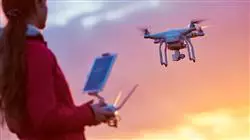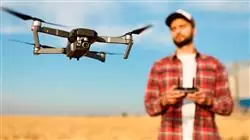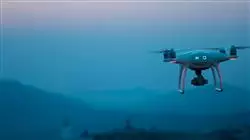University certificate
The world's largest faculty of journalism and communication”
Why study at TECH?
The New Tools for Digital Photography have caused a revolution in the industry. Get to know them and broaden your professional horizons"

Before drones, anyone who wanted to take photographs from the air had to resort to helicopters. As a result, photographers were forced to rent one and to equip themselves with telephoto lenses, which were quite stretched given the altitude at which a helicopter has to fly. However, the real problem with the altitude was the cost of renting a two-seater helicopter, which can reach 1,500 euros per hour.
This situation changed thanks to the arrival of drones. From simple toys, they are now equipped with the most modern technologies, such as long-distance remote control, built-in camera, autopilot and piloting through a screen. As for their price, they are certainly not cheap, but the great versatility and the enormous creative potential they confer on their owners more than compensate for the investment.
A great advantage compared to the helicopter lies in the fact that the drone can move closer overhead, not to mention the possibility of crossing trees and all kinds of obstacles, or even climb vertically up a wall and take pictures from angles impossible for a helicopter.
And the fact is that, as long as the current regulations are respected (which, by the way, will be carefully analyzed in this academic program), the drone provides the photographer with an infinite number of new niches in which to dedicate themself completely or partially.
Wedding photography, for example, is starting to use these devices more and more, as they allow the capture of shots of a previously unthinkable aesthetic value. The marketing, advertising and even journalism industries are also benefiting from the use of drones.
With this Postgraduate diploma, TECH progressively instructs the student on the handling of cameras and drones, without forgetting the different digital post-production techniques which are equally important to obtain high-level digital photographs.
Express your creativity with the use of the latest techniques and tools used in Digital Photography and make your passion your profession"
This Postgraduate diploma in New Tools for Digital Photography contains the most complete and up-to-date educational program on the market. Its most notable features are:
- Case studies presented by experts in this in the field
- The graphic, schematic, and practical contents which they contain, provide scientific and practical information on the disciplines that are essential for professional practice
- Practical exercises where the self-assessment process can be carried out to improve learning
- A special emphasis on innovative methodologies
- Theoretical lessons, questions to the expert, debate forums on controversial topics, and individual reflection assignments
- Content that is accessible from any fixed or portable device with an Internet connection
Take advantage of the opportunity offered by this Postgraduate diploma to become a professional sought-after by communication companies around the world"
The program includes, in its teaching staff, professionals from the sector who bring to this program the experience of their work, in addition to recognized specialists from prestigious reference societies and universities.
The multimedia content, developed with the latest educational technology, will provide the professional with situated and contextual learning, i.e., a simulated environment that will provide immersive learning designed for real situations.
This program is designed around Problem-Based Learning, whereby the professional must try to solve the different professional practice situations that arise throughout the program. The professional will be assisted in this by an innovative system of interactive videos made by recognized experts in New Tools for Digital Photography with a wealth of professional experience.
Media, agencies and firms are increasingly looking for aerial images taken with drones”

Forge your own style based on the knowledge you will acquire on this Postgraduate diploma”
Syllabus
The programmed syllabus for this academic program concentrates on the in-depth mastery of the camera, drones and post-production (the latter primarily focused on social networks and e-Commerce). In short, 3 modules with a duration of 150 hours each, designed to fully immerse the student in the acquisition of techniques and knowledge related to the use of New Tools for Digital Photography.

This Postgraduate diploma qualifies you to become part of a booming industry"
Module 1. Camera Usability
1.1. The Photographic Camera
1.1.1. The Photographic Camera
1.1.2. Types of Camera
1.1.3. Camera Modes
1.2. The Diaphragm
1.2.1. Diaphragm Aperture
1.2.2. Focal Distance and Perspective
1.2.3. Zoom
1.3. Sensors
1.3.1. Sensitivity
1.3.2. Megapixels
1.3.3. Sensor Ratio
1.4. Objective:
1.4.1. Objective
1.4.2. Lens Types: Telephoto, Wide-angle and Fisheye Lenses
1.4.3. Decentralized Lenses: Catadioptric Lenses
1.5. Attitude and Position in Front of the Camera
1.5.1. Hand Grip and Co-ordination
1.5.2. Protective Caps
1.5.3. The Purpose of the Photo Shoot
1.6. Trepidation and Motion
1.6.1. The Shutter
1.6.2. Exposure Speed
1.6.3. Trepidation
1.7. Use of Flash, Natural Light and Strobist
1.7.1. Additional Lighting
1.7.2. Use of Flash in Daylight Environments
1.7.3. Strobist Technique to Save Equipment
1.8. Camera Modes
1.8.1. Automatic
1.8.2. Semiautomatic
1.8.3. Manual
1.9. Camera Accessories
1.9.1. The Photometer
1.9.2. The Tripod
1.9.3. The Monopod
1.10. Concealment Accessories
1.10.1. Hide
1.10.2. Rain Covers
1.10.3. Underwater Casings
Module 2. Post-production of Digital Photography
2.1. Post-production: Limits of Photo Editing
2.1.1. Improved Texture, Color and Density
2.1.2. Blurring of an Image (BOKEH)
2.1.3. Color and Temperature Balance
2.2. Retouching
2.2.1. Selections and Layer Masks
2.2.2. Fusion Modes
2.2.3. Channels and Brightness Masks
2.3. Filters
2.3.1. UV or Skylight
2.3.2. Polarizer and Neutral Density
2.3.3. Color Filters and Black and White Photography
2.4. Special Effects
2.4.1. Neutral Density
2.4.2. Fine Art
2.4.3. Matte Painting
2.5. Montage
2.5.1. Photo Montage
2.5.2. Creative Retouching
2.6. Main Technological Editing Tools for Publishing on Social Networks
2.6.1. Hootsuit
2.6.2. Metricool
2.6.3. Canva
2.7. Narrative Expressiveness
2.7.1. Drawing on the Photographic Image
2.7.2. Lighting
2.7.3. Art Management
2.8. Creating Photographic Projects
2.8.1. Idea and Documentation
2.8.2. Script and Planning
2.8.3. Equipment and Resources
2.9. Corporate Photography
2.9.1. Lifestyle Photography
2.9.2. E-Commerce
2.9.3. Corporate Photography in Studio
2.10. The Personal Portfolio
2.10.1. Domain
2.10.2. Hosting
2.10.3. Wordpress/Behance
Module 3. The Use of Drones for Photography
3.1. New Tools for Digital Photography
3.1.1. Drones
3.1.2. Technical Composition of a Drone
3.1.3. Types of Drones
3.2. Learn to Fly
3.2.1. Flight System Stabilization
3.2.2. Internal Aspects: Safety
3.2.3. External Aspects: Meteorology
3.3. Legal and Geographic Limitations on the Use of Drones
3.3.1. Europe
3.3.2. U.S and Latin America
3.3.3. Rest of the World
3.4. Planning and Locations
3.4.1. Plan
3.4.2. Search for Locations
3.4.3. Applications and Checklists
3.5. Photographic Techniques Applied to Drones
3.5.1. Perspectives
3.5.2. Exhibition
3.5.3. Other Adjustments
3.6. Photographic Composition with Drones
3.6.1. Spatial Layout
3.6.2. Elements of the Image
3.6.3. Color
3.7. Photographic Composition with Drones II
3.7.1. Format
3.7.2. Elements of the Image II
3.7.3. Height
3.8. Special Techniques
3.8.1. Panoramas
3.8.2. Timelapse and Hyperlapse
3.8.3. Others
3.9. Filming with Drones
3.9.1. Technical Features of a Moving Film
3.9.2. Elements of the Image
3.9.3. Camera Movement
3.10. The Professional Drone Photographer
3.10.1. Training
3.10.2. Legal Aspects
3.10.3. Career Opportunities

A unique, key and decisive training experience to boost your professional development”
Postgraduate Diploma in New Tools for Digital Photography
Develop your visual talent and become a Postgraduate Diploma in New Tools for Digital Photography! The Faculty of Journalism and Communication at TECH Global University, offers you the opportunity to explore the fascinating world of digital photography at the hands of experts in a cutting-edge online program. Have you ever wondered how to capture the essence of a moment in an image? Do you want to master the most advanced techniques and the most innovative tools to enhance your photographic skills? Then this program is for you! Discover an exciting journey where you will acquire specialized knowledge while exploring the endless creative possibilities of digital photography. During the program, you will explore diverse subject areas, from the basics of photography to advanced digital editing and post-production techniques. You will learn how to use specialized tools and software, such as Adobe Photoshop and Lightroom, to maximize the visual impact of your images and achieve professional results. Our teaching team is made up of renowned digital photography professionals, who have extensive experience and up-to-date knowledge in the field. They will guide you, share their best tips and help you perfect your technique, so that you become an expert in the art of capturing moments with precision and style.
Take your photography skills to the next level
At the end of the program, you will receive a Postgraduate Diploma in New Tools for Digital Photography certificate, endorsed by TECH Global University, an institution internationally recognized for its academic excellence. This certificate not only certifies your acquired skills and knowledge, but also represents a valuable credential to stand out in the competitive world of work. Studying at TECH Global University is a unique opportunity to access a quality education backed by a leading institution in the technological field. In addition, you will be able to connect with a network of students and professionals passionate about photography, generating opportunities for collaboration and mutual growth. Once you complete the program, you will have the ability to work in various professional fields, such as advertising photography, photojournalism, fashion photography or even start your own business as a freelance photographer.







